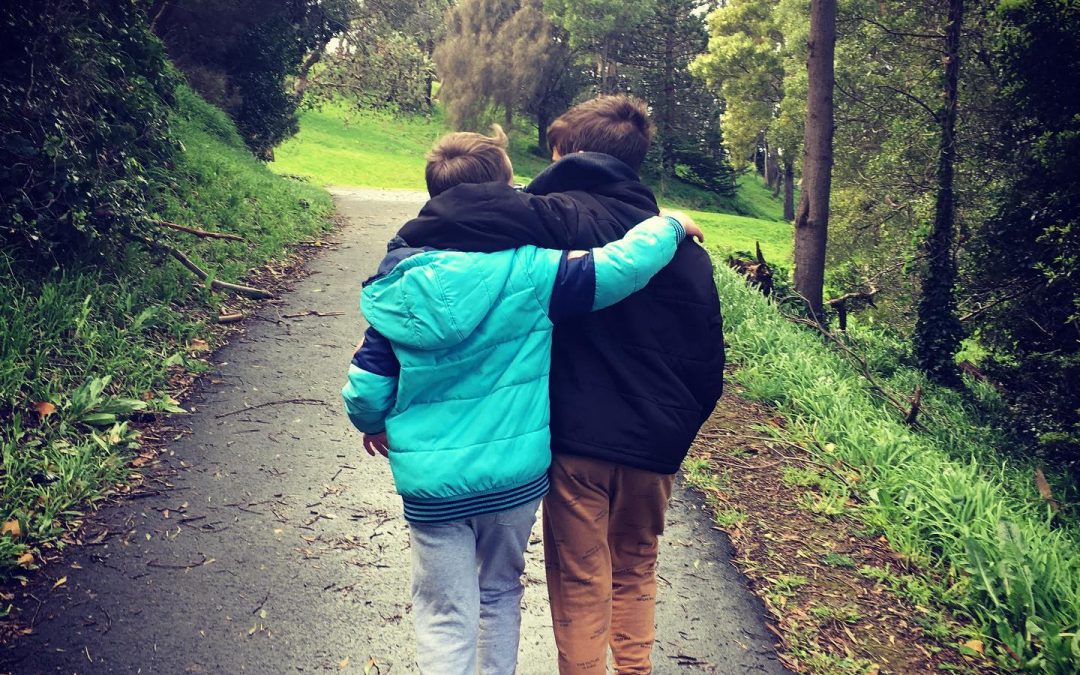Better understanding, unconditional love and compassion.
I recently saw a photo of two brothers that made my heart melt. With permission from their Mum, I am attaching that photo and you will understand what I am talking about. Ethan has Down Syndrome. He is an absolute delight and I enjoy every second I spend with him as a support worker. He is strong-willed, super inquisitive and always gets his own way! Seeing the photo of him with his brother Ewan walking beside him with his arm around him caused a lump in my throat. It made me realise how when you have a family member with disability, you love them unconditionally and would climb the highest mountain to protect them.
It also made me realise that I feel exactly the same way as Ewan. Our family has the privilege of being blessed with having Sandy in our lives. She adores her family and makes the most of every opportunity to spend time with them.
It dawned on me that our lives are much better with having a person with disability as a pivotal member. Actually, not only our immediate family, but also our extended family and friends. All my close friends also love and adore Sandy and go out of their way to include her in conversations, chat with her when they see her down the street and enquire after her well-being. The impact is far-reaching.
To be understanding is to be sympathetic to someone’s woes. Understanding someone means you get it – or you get them. You can see things from their perspective and can be a little more patient and tolerant. When my husband drops his food all over the floor while eating, he gets scolded. When Sandy does it, it is ok. We laugh and she helps to clean up the mess.
Unconditional love doesn’t run away when things get tough. Someone who loves unconditionally not only loves the other person despite these flaws, but they also love them because of them. Sandy is sneaky. If you start talking to her about something she has done wrong, or doesn’t want to do, she will change the subject and tell you that she loves you. It makes me laugh! She is very good at diverting the conversation – and I love her for that. When someone we know doesn’t say please or thank-you, we think them rude. When Sandy doesn’t say it, we remind her and she gives us a cheeky grin and says “sorry – I forgot”.
The meaning of compassion is to recognise the suffering of others and then take action to help. Compassion embodies a tangible expression of love for those who are suffering. Compassion gives us the ability to understand someone else’s situation and the desire to take action to improve their lives. For people who are dependent on others for help and support, compassion is often the most important factor in allowing them to lead fulfilling lives. Compassion is caring about others and behaving toward them with affection, generosity, and concern. As opposed to empathy (which is putting yourself in someone else’s shoes), compassion means having genuine feelings for other people’s struggles. When Sandy broke her ankle last year which resulted in surgery with a plate and eight screws and seven weeks in hospital, she was a trooper and never complained once. When a client calls to say they stubbed their toe and they can’t come to personal training, I think of Sandy’s resilience and determination.
So, having a person with disability in our family certainly makes us show more understanding, conditional love and compassion.

Sandy feeling pretty pleased with herself after climbing the Corkscrew last year. She tried to get out of it (fear of heights) but I somehow managed to bribe her to get to the top. She was so excited and even commented on another lady who was shaking with fear.

